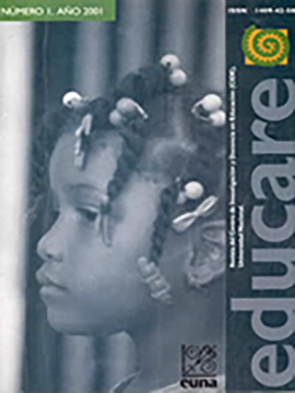El administrador educativo como líder académico
DOI:
https://doi.org/10.15359/ree.2001-1.3Abstract
The author analyzes the dilemma facing educational administrators when they try to clarify their on beliefs and expectations regarding the role they are to perform. By and large, when these individuals become principals, they assume the role of administrators per se rather than that of academic leaders. This situation has serious implications for the improvement of the quality of education. To overcome this weakness, the author proposes the renewal of the academic offer of the universities with a new conceptual framework that holistically prepares the new generations of academic leaders.References
Anderson, M. E. (1991). Principals: How to train. recruit. select, induct
and evaluate leaders for Amtrica's schools. Eugene, OR: Clearinghouse on Educational Management, University of Oregon.
Bennis, W. (1994). On becoming a leader. Reading, Massachusetts: Addison· Wesley.
Blum, R. E., Blutler, J.A., y Oison, N. L. (1987). Leadership for excellence: Research based training for principals. Educational Leadership, 45 (1), 25-29.
Covey, S. (1990). Principle centered leadership. New York: Simon &
Schuster.
Department of Educational Leadershhip (19'94). Master in Educational
Administration. Greenville, NC: ECU.
Duttweiler, P.C. (1988). Organizing for excellence. Austin, TX: Southwest Educational Development Laboratory.
Enochs, J.C. (Novembel 1981): Up Crom Managcmeno, Phi Deún Kappan 63, 175.
Frymier, J., Combleth, C, Dobnmoyer, R. y otros (1984). One houndred good schools: A report of the good schools project. West Lafayette. Indiana : Kappa Delta Pi.
Glickman. C. D. (1993). Renewing America's schools: A guide for school based action. San Francisco: Jossey Bass.
Hallinger. P., y McCary. C.E. (1990). Developing the strategic thinking of instructional leaders. Elementary School Journal 91, 89-108.
Heck, R. H. (1992). Principal's instructional leadership and school performance: Implications for policy development. Educational Evaluation and Policy Analysis, 21-34.
Holdzkom, D. (l985). Educational management : A literature review.
Raleigh, NC: North Carolina. State Deparment of Public lnstruction.
Kouzes J.M. y Posner. B.Z. (1987). The leadership challenge: How to get extraordinary things done in organizations. San Francisco: Jossey-Bass.
Levine. D. U. (1991). Creating effective schools: Findings and implications from research and practice. Phi Delta Kappa, 72, 389-397.
McConnell, T.R., "The function of leadership in academic institutions."
in Leadership and Social Change, William R. Lassey, ed. (lowa City, IA:
University Associate, 1973), 169.
Pichardo. A. (2000) en Jiménez. G. y Villalobos. D. " Costa Rica en el
mundo: los próximos cincuenta años'', ed. (Heredia., Costa Rica: Editorial Fundación UNA. 1973). 435-451.
Senge. P. (1990). The fifth discipline: The art & practice of the learning
organization. New York: Currency Doubleday.
Vincenzi, M. (1941). Guía del maestro costarricense. San José. Costa
Rica: Editorial Soley y Valverde.
Vincenzi, M. (1951). Vida ejemplar del general don Francisco Menéndez: Mensaje a los políticos de América. San Salvador
: Editorial Ahora.
Wynn, R. y Guditus. Ch. W. (1984). Team management: leadership by
consensus. Columbus. Ohio: Charles E. Merrill Publishing Company.
Published
How to Cite
Issue
Section
License
1. In case the submitted paper is accepted for publication, the author(s) FREELY, COSTLESS, EXCLUSIVELY AND FOR AN INDEFINITE TERM transfer copyrights and patrimonial rights to Universidad Nacional (UNA, Costa Rica). For more details check the Originality Statement and Copyright Transfer Agreement
2. REUTILIZATION RIGHTS: UNA authorizes authors to use, for any purpose (among them selfarchiving or autoarchiving) and to publish in the Internet in any electronic site, the paper´'s final version, both approved and published (post print), as long as it is done with a non commercial purpose, does not generate derivates without previous consentment and recognizes both publisher's name and authorship.
3. The submission and possible publication of the paper in the Educare Electronic Journal is ruled by the Journal’s editorial policies, the institutional rules of Universidad Nacional and the laws of the Republic of Costa Rica. Additionally, any possible difference of opinion or future dispute shall be settled in accordance with the mechanisms of Alternative Dispute Resolution and the Costa Rican Jurisdiction.
4. In all cases, it is understood that the opinions issued are those of the authors and do not necessarily reflect the position and opinion of Educare, CIDE or Universidad Nacional, Costa Rica. It is also understood that, in the exercise of academic freedom, the authors have carried out a rogorous scientific-academic process of research, reflection and argumentation thar lays within the thematic scope of interest of the Journal.
5. The papers published by Educare Electronic Journal use a Creative Commons License:

















 The articles published by Educare Electronic Journal can be shared with a Creative Commons License:
The articles published by Educare Electronic Journal can be shared with a Creative Commons License: 



